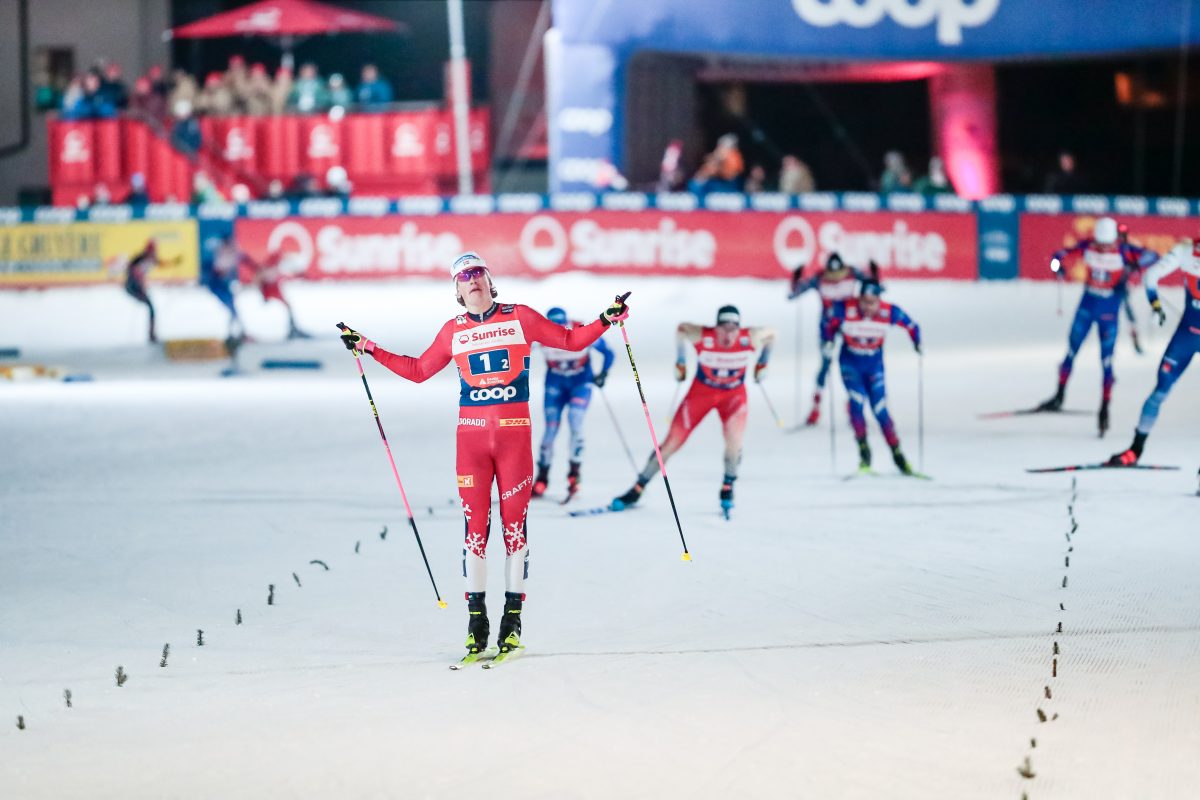
There was a moment in today’s 50 k skate race in Oslo, Norway, where it looked like Canada might repeat its resounding success from the 50 k at World Championships in Falun, Sweden, two weeks ago.
At ten kilometers, Alex Harvey and Ivan Babikov were both skiing in the top five of the mass start, looking comfortable. Would they go on to replicate their fifth and 30th place results?
It wasn’t to be. Harvey led the way with a 13th-place finish and Babikov eventually faded to place 27th, but further back (+4:55) than in Falun. (And Graeme Killick, who placed 19th in Falun and whose result represented positive signs for Canada’s future teams, wasn’t even racing.)
But there seemed to be little disappointment from the Canadian camp. Harvey was happy with his finish, and deemed it a good way to finish off a season in which he earned two World Championships medals and finished ninth in the overall World Cup standings.
“I’m really happy,” he said. “It’s probably my best skate race of the season, so I’m happy to finish like that on a positive note. It has been a really good season.”
“Holmenkollen is the best place to finish WC season,” Babikov tweeted. “Amazing atmosphere, crazy fans! Made some tactical mistakes, but happy to finish in points.”
For Harvey, who has shown all season that if he can stay with the lead group until the finish he has scary finishing speed, expectations had been low because he feels he hasn’t done well in skate races this season. On top of that, he suffers from a leg problem which makes skating up steep hills painful. It’s bad enough that he’s leaving Oslo on Sunday to go directly back to Canada for surgery; he should be back training by May.
“Skating has been going quite bad for me this year, and the course with those huge uphills, I didn’t expect much,” Harvey admitted. “But it ended up being a pretty good race.”
Harvey stayed in the main pack until the last few kilometers, when Hans Christer Holund of Norway and then Dario Cologna of Switzerland pushed the pace. They successfully fractured the lead group of 15, and Harvey had already been skiing near the back of that pack.
“On the last push up to Frognerseteren I lost some ground and then from then on it was just kind of survival mode,” Harvey said. “But 13th, I’m still happy with the result.”
Skiing into the finish, he beat out Cologna’s teammate Toni Livers in a sprint by just two tenths of a second. He was 52.7 seconds behind Norway’s Sjur Røthe, who edged Cologna in a photo finish for the win.
If Harvey has one regret, it’s that he didn’t change his skis near the end of the race. In the past few years, FIS has implemented rules that skiers may change skis twice during the course of a 50 k competition.
Harvey’s best pair of skis, which he started on, were great in the slush and so he didn’t change them until 33 kilometers into the race.
“My skis were really good so I decided not to switch when the guys went after two laps,” Harvey said.
After the success of Lukas Bauer of the Czech Republic in Falun, who changed his skis just five kilometers from the finish and used their fresh speed to power to a World Championships medal, Harvey thought of doing the same thing, switching back to his best pair – now with an added topcoat of fluoros – with nine kilometers to go.
But then the pace increased, and it seemed like a bad idea.
“Just before [the stadium], Sundby went to the front and pushed kind of hard going up the Hellnerbacken coming into the stadium,” Harvey explained. “I thought, oh, maybe he’s going for a long drive. I could have seen that from Martin because he might not want it to end in a sprint. So if he went hard the whole way, I couldn’t change because I would lose the group.”
As it happened, nobody was able to make a break at the time, so the pace slowed down again. Anders Gløerssen of Norway decided to switch skis, and was the long member of the lead pack to do so. He lost time, but managed to catch a few straggling members of the pack, including Harvey, and finish 11th.
“Gløerssen changed there and it was good for him,” Harvey said. “Right after that the pace slowed down and it was good. But I didn’t want to risk losing the group because I was starting to fade and I knew I wouldn’t be able to close a 15 second gap on my own. Looking back, had I known the pace would slow down again, I probably would have switched.”
The Canadian men’s team finished the season in eighth place in the Nations Cup standings.
Chelsea Little
Chelsea Little is FasterSkier's Editor-At-Large. A former racer at Ford Sayre, Dartmouth College and the Craftsbury Green Racing Project, she is a PhD candidate in aquatic ecology in the @Altermatt_lab at Eawag, the Swiss Federal Institute of Aquatic Science and Technology in Zurich, Switzerland. You can follow her on twitter @ChelskiLittle.



